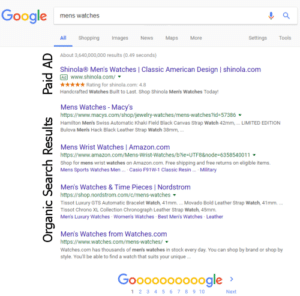SEO or Search Engine Optimization refers to the set of activities aimed at improving the organic search engine rankings of websites, online stores, and any other online presence. The algorithms used by search engines such as Google are constantly evolving, and the results they show are based on various factors that are considered relevant and authoritative. As a small business owner, you should care about SEO because it can help you stand out in a crowded market and attract more customers to your business. In fact, SEO can be thought of as word-of-mouth advertising from a trusted friend, as it can drive customers to your door if done right. In today’s digital age, SEO is no longer an option but a necessity for businesses that want to remain competitive and maximize their return on investment. By implementing effective SEO strategies, you can increase your online visibility, drive more traffic to your website, establish your brand’s credibility, and gain valuable insights into customer behavior.
What Is SEO – Search Engine Optimization?
SEO or Search Engine Optimization is the name given to activities that attempt to improve search engine rankings for websites, stores, and anything with a web address organically (non-paid). The results revealed by search engines are solely based on independent algorithms based on ever-changing criteria that search engines consider relevant and authoritative. (i.e. Google)
Why SEO? Importance of SEO
Why should you as a small business owner be concerned about search engine optimization (SEO)? Growth! SEO gives your customers greater opportunities to find your business amongst the sea of competition. It is more like word-of-mouth advertising from a personal friend, and in the right situation can drive customers through your door. Plus in this day and age of technology, search engine optimization is no longer an option for businesses especially if they expect to be competitive, grow, and maximize their return on investment. SEO will provide you with visibility, traffic, credibility, and branding and help you gain valuable insight into customer behavior.
How do Search Engines Work?
There are over 130 million recorded websites (and growing) on the internet. To help us sort through it all, most of us rely on search engines to find what we want. These search engines have become quite good at doing what they do, that’s over 90% of the people using the internet rely on them to find exactly what they want. Now there are a lot of good search engines out there but about 74% of people worldwide use Google. If you would like a piece of more in-depth information, check out my article Search Engines Explained. How Does Search Engine Work?
Internet Search Engine – Google Results Page
When you search for something online (typically with Google), Google will search its database and pull all the data closely related to your search query. These results are displayed on what many know as the ‘Google Results Page’. There’s lots of stuff displayed on this page, and it shows you how many websites Google found that are relevant to what you’re looking for. Here is how the Google Results Page is the setup:
Top of the Page – Paid Google Search Ads
The very top of the Google Search Page will reveal paid ads for specific keywords [AD]. In the digital marketing industry, this is known as ‘Pay Per Click Advertising’ (PPC). Depending on the volume of monthly searches, and the competition of advertisers, an advertiser can pay anywhere from $2 per click to $75 per click. In my example of ‘Dark Roast Coffee’, an advertiser will pay roughly $2.24 per click for a monthly search volume of 3,600.
Organic Search Results
This next section displays Google’s Search Results – Organic Results. Organic results are unpaid search results that are ranked by their relevance to the query entered into the search engine (i.e. search phrase or keyword). Organic listings are ranked based on a number of unique factors all controlled by search engines. So when you and I search for a particular keyword, this is the section most people care about.
Interesting facts about Google’s first page of SEO search results? Does Position Matter?
Statistics and analytics state that over 94% of users only click on search results displayed on the first page. This can be further analyzed and broken down to position and market share of desktop versus mobile users.
| Desktop | VOL | Mobile | VOL | |
| Position 01 | 32.7% | 36,003 | 23.6% | 25,927 |
| Position 02 | 13.4% | 14,784 | 12.3% | 13,486 |
| Position 03 | 8.7% | 9,614 | 8.2% | 9,053 |
| Position 04 | 5.5% | 6,083 | 5.3% | 5,797 |
| Position 05 | 3.8% | 4,202 | 3.6% | 3,982 |
| Position 06 | 2.7% | 2,959 | 2.5% | 2,739 |
| Position 07 | 2.0% | 2,178 | 1.8% | 1,980 |
The table above is based on the Keyword Phrase of ‘Coffee Bean’ with a search volume of 110,000 per month. The top 3 positions otherwise known as the golden triangle receive over 54% of the total search volume.
How does Google Index Websites? Website Page Rank
Have you ever wondered why some sites are displayed on the first page of Google while others are lost in search pages way down the rabbit hole? To answer that question, it needs to be understood that a website’s ranking (position) is completely based on a page’s rank as defined by the search engine. Every page on a website is ranked on its own basis (fundamentally – we are talking in basic terms) and judged for specific terms, phrases, or keywords. Search engines constantly visit sites and verify, re-verify, and authenticate a website’s content ensuring your search results are valid and exactly what you are searching for.
Now to clarify my use of ‘Fundamentally’… Each page is independently measured on its own merits; however, a website’s overall ranking (keyword niche or what Google classifies it for) can be modified by the overall content of each page passing authority back and forth to each other.
- Example 01 – Supportive Niche Keywords from page to page (Niche: Houston Realtor)
- So if you’re a Realtor in the city of Houston, then a blog article titled ‘How to Use Curb Appeal to Sell Your Home in Houston’ is completely supportive of an overall Realtor’s website allowing page authority (ie juice) to pass from the article to the overall site (and back and forth).
- Example 02 – Non-Supportive Niche Keywords from page to page (Niche: Houston Realtor)
- So using the same Realtor example, if you have a blog article titled ‘My Summer Vacation trip to Venice Beach, CA’ is going to create a conflict with your overall site niche (parent domain) preventing the authority from passing from one page to another possibly creating a negative ranking in some situations.
Google Crawler

Search engines such as Google, Bing, and Yahoo have programs that proactively search for new websites and add them to their database of sites (indexes). These programs are commonly referred to as bots, spiders, crawlers, or robots. All of the largest and most popular search engines today are of this type, including Google, Yahoo, MSN, and Ask. Now that I’ve set the foundation of what a Search Engine Crawler is, I will focus the remaining article on how they work since their impact is so critical as more than 99.9% of web searches are conducted by search engines. I know this is common sense for many; however, there are a lot of individuals who need some basics and I hope to offer information for all skill levels.
The Website Crawler
As briefly mentioned above, search engines index websites using a crawler (AKA bots, spiders, and crawling robots). The crawler reads pages into the search engine raw database of every page the search engine crawler has read.
Here are a few important items to know about website crawlers
- Bots periodically go back and revisit every web page in their databases. Why should this matter?
- The first point is to remember that you do not need to reinform the search engines that your site has changed. As long as your page is already registered with the search engines, they will in due course update their databases after you made a change.
- How often do they revisit my site? Search Engines will occasionally revisit your site and the frequency is completely dependent on the specific search engine. You can attempt to request a revisit by using Google’s URL Inspection Tool but completely determined by the importance of your site (determined by Google). I found it can take as little as a day, to a few days, and in some cases more than a week.
- Search bots/crawlers follow the links as listed on your pages. They will start with the links that are already indexed in their database looking for modifications and changes searching for new links. Why?
- The point to keep in mind is that upon adding a webpage to your site, it is important to make sure to add links from established web pages to it.
- By adding a link from an established web page, it eliminates the need to submit a request to Google to crawl the new page or website.
- There are some engines that have pages that allow you to submit webpages to be crawled (such as the Google Fetch Tool). Does this really matter?
- With a brand-new site with no established links to it, search engines will have difficulty finding your pages at first glance. This is why it is so critical upon developing a new site to use tools such as Google Fetch Tool to initiate site indexing. I find that many sites never get indexed (never rank) because Google has no idea where it is or what it is (niche). To check if Google or any other indexing site has indexed your site, simply go to their site (ie google.com) and enter the following ‘site:YourWebSite.com’. This will tell you how many of your pages have been indexed. So after doing that, if you need to index your site, I would recommend the following indexing links below:
- Ask Google to ReCrawl / Crawl Your URLs
- Google Webmasters Tool (Google Search Console) – Fetch
- Google Search Console – URL Inspection Tool
- Bing Webmaster Tools – How to Submit through Bing Webmaster Tools
- Bing Webmaster Tools
- Other Indexing Services which I have used in the past. Personally, I would recommend staying with Google; however, I still get questions on what I’ve used in the past. Here are three services:
- Indexification.com – Paid Service
- Lindexed.com – Paid Service
- InstantLinkIndexer.com – Paid Service
- Human-powered directory sites (ie Mahalo.com, ChaCha.com, Rollyo.com) do not use spiders to list your site and typically you must submit a request to get listed.
- With a brand-new site with no established links to it, search engines will have difficulty finding your pages at first glance. This is why it is so critical upon developing a new site to use tools such as Google Fetch Tool to initiate site indexing. I find that many sites never get indexed (never rank) because Google has no idea where it is or what it is (niche). To check if Google or any other indexing site has indexed your site, simply go to their site (ie google.com) and enter the following ‘site:YourWebSite.com’. This will tell you how many of your pages have been indexed. So after doing that, if you need to index your site, I would recommend the following indexing links below:





